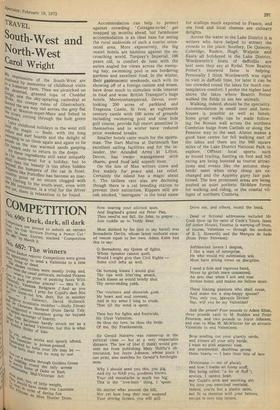TRAVEL
South-West and
North-West
Carol Wright
MY impressions of the South-West are rtnsehueri Somerset ~ ,-,Y memories of childhood visits tea oonierset farm. Then we picnicked on deserted, grassed tops of Cheddar rge, saw the sky-spearing cathedral at
,_ ells, .., th
ti e creepy ruins of Glastonbury, °snted the sea way out across the grey flat „and at Weston-super-Mare and fished in me ri, irleario;:rss. cutting through the lush green het Laer childhood holidays in the west still rd the magic — Bude, with the long s'ets and surf boards and the delight of aZei,3_ing in on them again and again to lie for's'i on the sun warmed sands gasping Allireath 0n1Y to return to the deeps. in t these ingredients still exist uniquely ectaithe south-west for a holiday, but to be ` eYes the beauty is too often hidden porind the bumpers of the car in front. teaerss sPiebrire Point o pliokiePortofino has become an inacof no return clogged with the mGetting to the south-west, even with 411(1 4 extensions, is a trial for the driver Yet, there is relaxation to be found.
.,,COMPETITION
Accommodation can help to protect against crowding. 'Cottages-to-let' get snapped up months ahead, but farmhouse accommodation is an ideal base for seeing the rural underside of such a tourist orientated area. More expensively, the big resort hotels are bastions against the encroaching world. Torquay's Imperial, 106 years old, is comfort de luxe with the suites angled for views across the sweeping bay, swimming pool in sea bordering gardens and excellent food. In the winter, their gastronomic weekends, each with its showing off of a foreign cuisine and wines, have done much to stimulate wide interest in food and wine. British Transport's huge hotels, Moretonhampstead, Devon, overlooking 200 acres of parkland and Tregenna Castle, St Ives, an eighteenth century castle with 100 acres of grounds including swimming pool and nine hole golf course, provide full resort amenities in themselves and in winter have reduced price weekend breaks.
Smaller hotels cater much for the sportsman. The Dart Marina at Dartmouth has excellent sailing facilities and for the inlander, the Arundell Arms at Lift on, Devon, has owner management with charm, good food and superb river.
On the Isle of Man writers come and live mainly for peace and tax relief. Certainly the island has a magic about it. The tailless cats alas are declining though there is a cat breeding station to prevent their extinction. Kippers still are oak smoked, tanrogans ' is the local name for scallops much exported to France, and sea food and local cheeses are culinary delights.
Across the water in the Lake District it is writers who have helped to attract the crowds to the place. Southey, De Quincey, Coleridge, Ruskin, Hugh Walpole and Keats all holidayed in the Lake District. Wordsworth's hosts of daffodils are best seen they say at Rydal. Now 13eatrix Potter's renewed fame is helping. Personally I think Wordsworth was right to visit in daffodil time, for later it can be too crowded round the lakes for much contemplative comfort. I prefer the higher land above the lakes where Beatrix Potter walked the fields to see her animals.
Walking, indeed, should be the speciality. Accommodation in small inns and farmhouses is possible as well as hotels. Some great walks can be made following the Roman wall across the northern Cumbrian bulge from Carlisle or along the Pennine way to the east. Alston makes a good base centre for fell walking east of the lakes and there are the 880 square miles of the Lake District National Park to explore. Offbeat local sports such as hound trailing, hunting on foot and fell racing are being boosted as tourist attractions and events like the autumn shepherds' meet when stray sheep are exchanged and the Appleby gipsy fair publicised. The less prominent areas are being pushed as quiet pockets: Skiddaw forest for walking and riding, or the coastal villages of northern Cumbria.










































 Previous page
Previous page